The fall of Egyptian President Hosni Mubarak followed directly the overthrow in January of Tunisian President Zine al-Abidine Ben Ali. The two strongmen had much in common, beginning with their secret police. Mediapart has gained access to documents seized during the strife in Tunisia which illustrate the extent of the Ben Ali regime's nationwide web of informers, ranging from taxi drivers to undercover agent 'opposition activists'.
-------------------------
During the 23-year rule of Tunisian President Zine al-Abidine Ben Ali, the country's police force grew four-fold in numbers. to reach some 100,000 officers for a population of 10.4 million. Tens of thousands of Tunisians were arrested under the regime, and many were victim of regular police practices of torture.
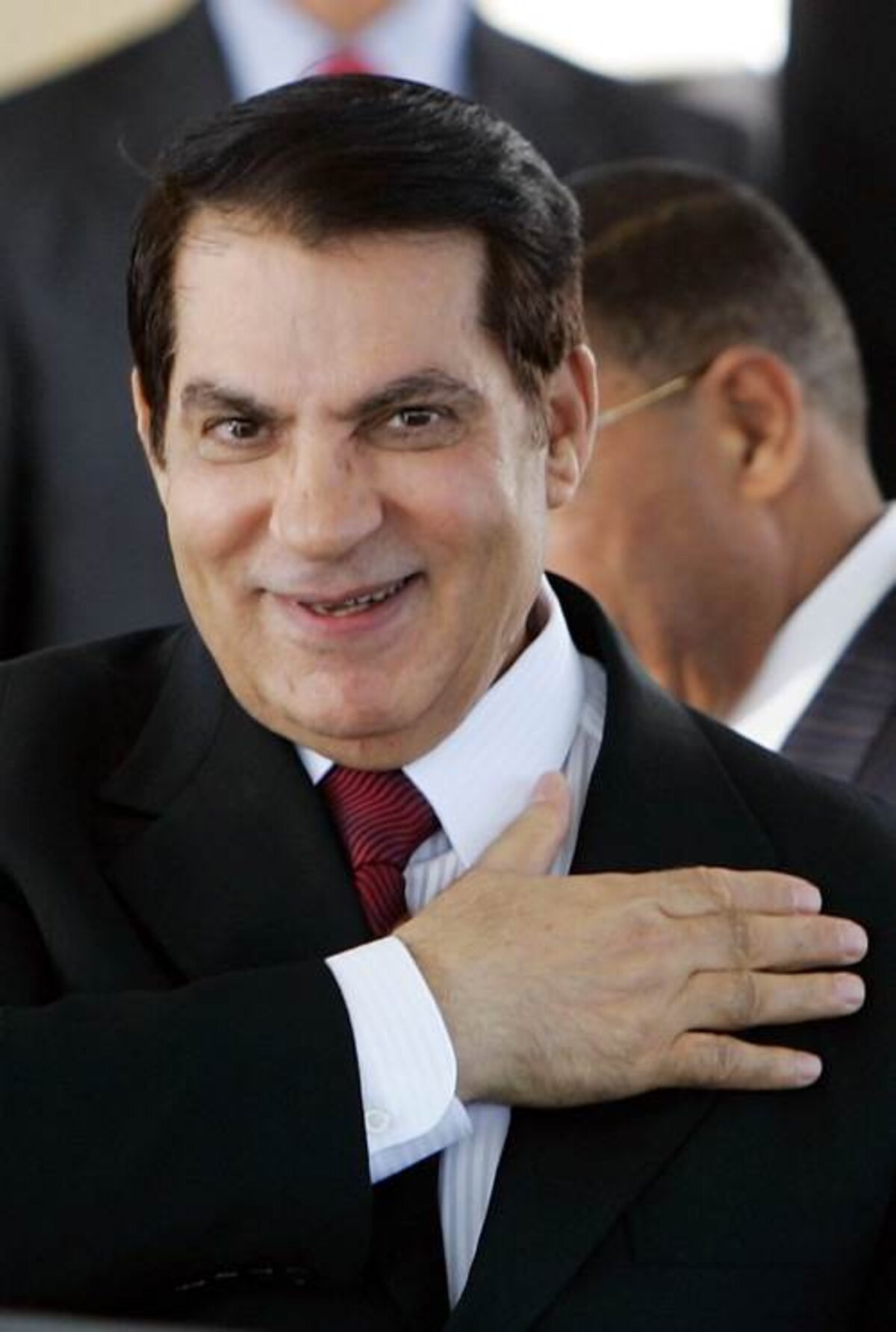
Enlargement : Illustration 1

The population was the subject of widespread official spying, a repressive lid that stifled free speech andinduced fear during even normal conversation. It included a vast network of informers that in some towns were established street by street.
Following the January revolution, Mediapart has obtained access to official documents seized by demonstrators during the troubles and which reveal the surveillance practices on an everyday level. We present translated extracts here, along with interviews conducted in Tunis with those for whom the long arm of the Ben Ali regime's machine of surveillance and harassment remains uncomfortably close.
The oldest of the documents consultedby Mediapart dates back to March 2nd, 1994. This is a letter classified as ‘Top secret' (see photo below), written by the sub-prefect (who had the role of mayor) of the town of M'Saken, 140 kilometres south of Tunis. It was addressed to the governor of the region of Sousse.
Referring to the presidentialelection campaign, it reads: "I have the honour of informing you that we have instructed X [Editor's note: name removed by Mediapart] to infiltrate the Movement of Communist Democrats and to follow their activities during the electoral campaign."
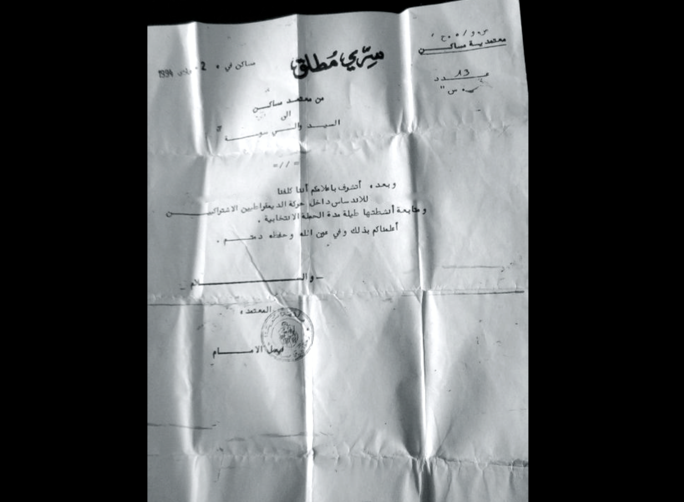
Enlargement : Illustration 2

The missive, which carries the number "13", ends with the usual formalities: "May Allah protect you". That year Ben Ali one the elections by a majority of 99.91%.
'Even in the car with my husband, we dared not speak'
Another document drawn up by an official with the municipal authorities of Boum'hel, 15 kilometres south of Tunis, and which was photographed in haste by demonstrators during the recent protests that toppled Ben Ali, gives an idea of the extent of the spying on the population. It is a table, with the first column containing the districts of the town. In the second column, the districts are divided into four main roads. In the third column figures the name of police informers, road by road.
According to many witness accounts given to Mediapart journalists in Tunis, there was a widespread impression among civil servants, academics, company personnel and of being spied upon by police officers belonging to the ruling RCD party, both at the workplace and in everyday life.
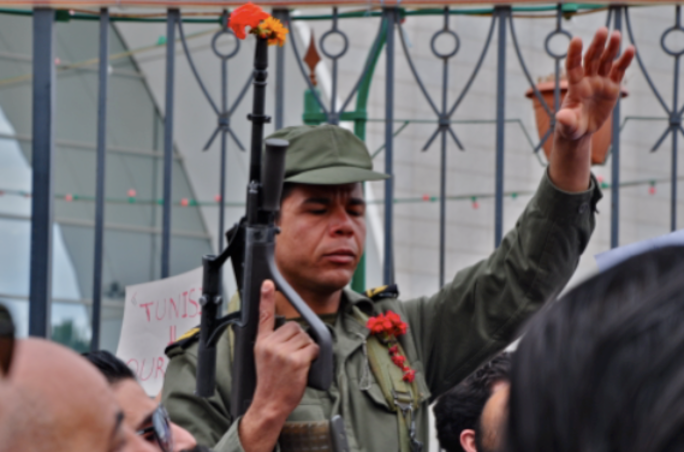
"In our department there was an agent for the authorities," said Djamila (last name withheld), a university lecturer in Tunis. "They give him a car, he becomes an eye, he watched over all the personnel. He knew where I lived, what I ate. You cannot be the head of a service or a director if you are not RCD. The municipal heads, the local councilors, the delegates, all the higher civil servants belong to the RCD." Djamila believes the "spider's web is intact", despite the revolution.
Alya (last name withheld), a higher education student in Tunis spoke of the oppressive climate of suspicion: "before, it was good-day and good-night, we spoke only when we were among the family, and even then," she said. "We were wary of neighbours. We knew there were informers, the concierges, the neighbours. Even in the car with my husband, we dared not speak. It's like a permanent stress, a weight, that we feel much less today."
A journalist in one of Tunis' leading newspapers told of how she suffered a nervous breakdown because of the permanent surveillance by some of her colleagues who were known by all to be paid by the police to spy on staff. Another journalist recalled how he received phone calls from mysterious women offering their services for sex. "The regime hoped to have a hold on everyone either through money or by sex affairs."
Still today, people are fearful of talking about sensitive issues such as corruption and abuse on the phone, preferring to meet - and preferably in a discreet place. One European diplomat in Tunis, who asked not to be named, said he would deliberately choose to give false meeting places on the phone to lead the police on the wrong track. "When I had opponent on the line, we spoke with key-words and we never agreed to a meeting by phone," he said. "Among them was a lawyer who acted for Islamists. It was their red-hot line." One of Ben Ali's ministers once accused the diplomat of being an "activist". The diplomat expressed his hope that what he called "intimidations" had stopped. If not, he said, there would be "carnage" given how people are now far less cautious.
Making spies of taxi drivers and street-merchants
Countering the Islamists was a cause used by Ben Ali over many years in order to obtain the support of Western democracies, not least France, who in exchange turned a blind eye on the despotic nature of his regime. Some of the documents seen by Mediapart show that the surveillance, and even harassment, of Islamists was also used as a means of keeping the population under control.
Beyond the monitoring of mosques, including the recording of how many attended prayers or the subjects raised during the preaching, the anti-terrorist activities included the surveillance of public spaces.
A report addressed to the interior ministry and the state security services about "efforts to counter the terrorist danger", signed by the director of the prefecture of Bizerte, in the north of the country, and dated March 27th 2008 (see below), advises: "concentrate on spaces dedicated to internet [editor's note: cyber cafés] and the collaboration with [their] owners" who should be told to keep "special notebooks" about all those who use their business, whether Islamist or not.
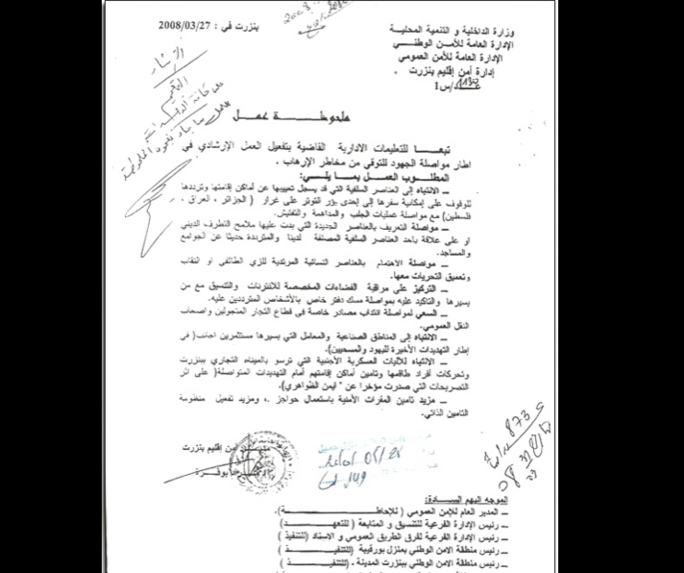
Enlargement : Illustration 4

The report contains a paragraph about the recruitment "of special sources among street vendors and owners of public transport companies", the latter applying to collective or individual taxi services.
The main target of the regime's campaign against terrorism were the Salafists, a hard core Islamic movement which includes jihadists but also others who follow non-violent political doctrines.
Two police arrest reports obtained by Mediapart show that it took little to be treated as a villain. One of them relates to an arrest on November 17th 2007 in Nabeul, a coastal town in the north east of the country, of a "group of beardies". They were detained because they had beards. The arresting police officers noted: "They told us that they were discussing religious questions, notably about the life of a disciple of the Prophet." There is no mention of what became of the arrested men, but it describes one of them as a Salafist known to the police.
The second police report, stamped "secret", refers to the arrest on March 18th 2009 of a 24 year-old woman from Beni Khiar, a port close to Nabeul, because she was wearing a veil. "After verification with her, it became apparent that she regulalrly goes to prayers," the report commented. "She was told that she must stop wearing the religious costume and to show that she was ready to comply."
Ben Ali family Mecca penthouse
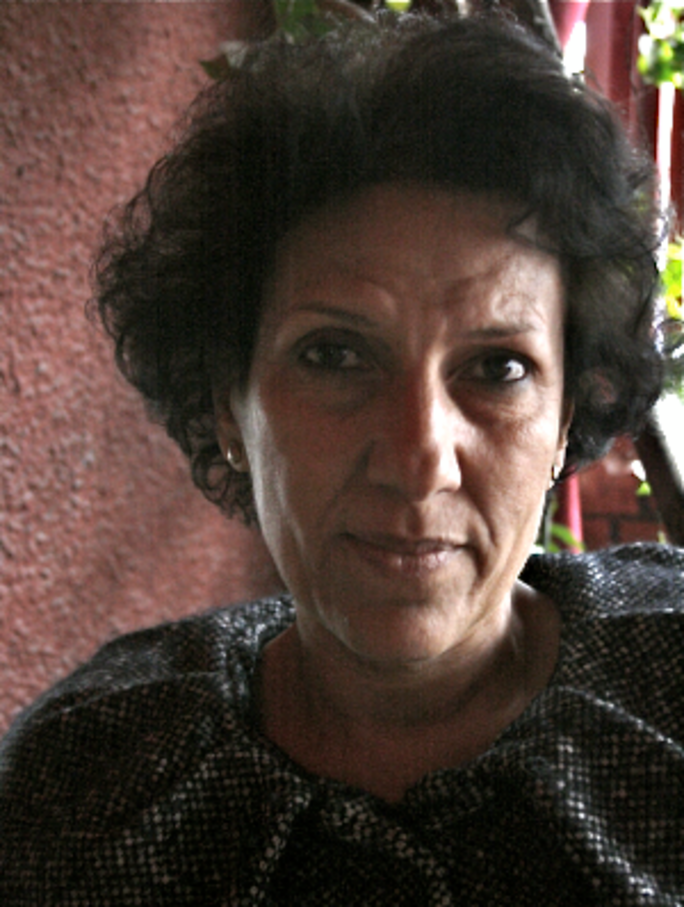
The Tunisian lawyer and human rights activist Radhia Nasraoui told Mediapart that the repression applied to Islamists was also used against Leftist opponents of the regime and union leaders. "They are the same practices, the same torture methods, the same harassment," she said. "Except that, from the beginning of the Ben Ali regime, people from the left were better defended in prison because they had a tradition of struggle."
Nasraoui said her legal work on behalf of Islamist prisoners caused her problems with others in the Tunisian opposition movement. "I lost friends who did not easily understand that I defended the rights of Islamists," she recounted. "I am however known as someone of the left, secular and deeply anti-fundamentalist. I don't in any way share their ideas but it is inadmissible to torture them because they go to prayer or even base themselves on the Sharia."
During the revolution, a house in the coastal town of Hammam Sousse belonging to Hayet Ben Ali, sister of the deposed president, was ransacked and documents seized. They included a letter (see further below) dated April 20th 2006 concerning a "final offer" for the purchase by her and her husband of a 16th-floor apartment in a future high-rise building project in Mecca, Saudi Arabia.
The couple were mulling the final asking price of 1,322,030 dollars for their penthouse in the huge property development scheme of the Abraj Al-Bait Towers, with a view over the largest mosque in the world, Al-Masjid al-Ḥarām.
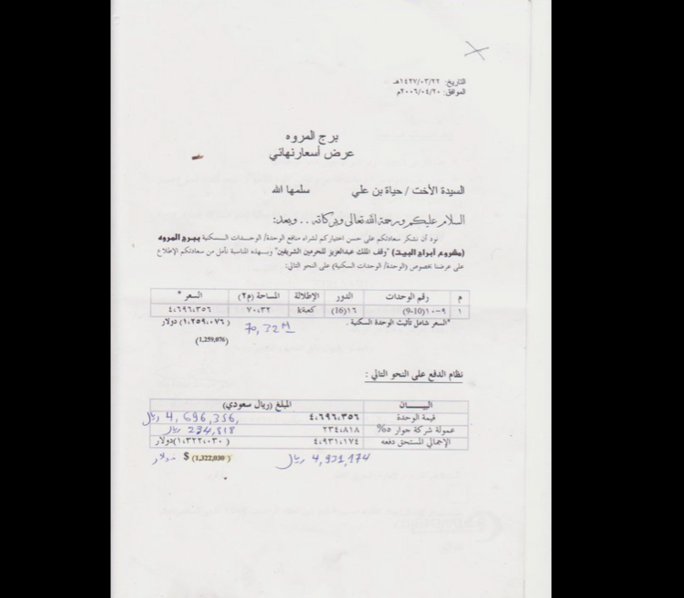
Enlargement : Illustration 6

Saudi Arabia is of course also where Ben Ali fled in exile on the night of January 14th. The country is an Islamic monarchy that has long championed the Salafist teachings of the 18th-century Arab scholar Muhammad Ibn Abd-al-Wahhab.
-------------------------
English version: Graham Tearse


